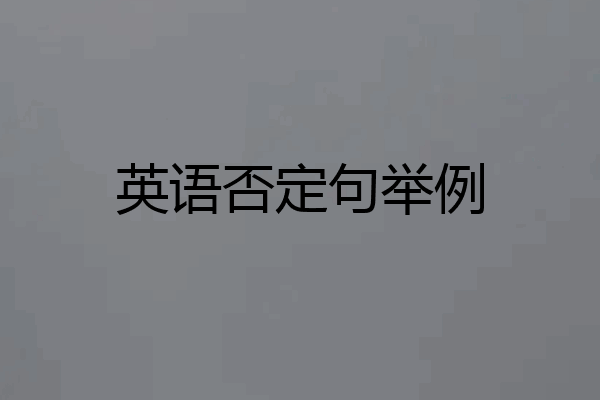
大萌的饰界
1、not表示否定,句型为主语+联系动词be+表语,在be(am/are/is/was/were)后面加not即构成否定句。如:I am not hungry.我不饿。2、主语+助动词(be,have和will)+谓语动词,在(be,have和will)后面加not即构成否定句。
1、句型为主语+情态动词(can,could,may,might,must,should等)+谓语动词:
在情态动词(can,could,may,might,must,should等)后面加 not 即构成否定句。
She could not help laughing.
她禁不住笑了起来。
The old man cann't read and write.
那老人没有文化(不会读写)。
You shouldn't have given up.
你本不该放弃的。(实际放弃了)
You needn't do your homework today.
今天你不必做作业。(must 必须的否定,用need not 或don't have to)
The kids mustn't swim without grown-ups nearby.
没有大人在旁边,孩子们禁止在河里游泳。(mustn't是“禁止,不允许”)
2、句型为主语+谓语动词(谓语前没有助动词):
在谓语动词前加助动词do/does/did not即构成否定句。谓语动词用原形
I don’t have any foreign friends. 我没有任何外国朋友。
She doesn’t know Mr. White. 她不认识怀特先生。
My mother doesn’t speak English. 我母亲不会讲英语。
It didn't rain last night. 昨晚没有下雨。
Mary didn’t clean the room this morning. 玛丽今天早晨没打扫了房间。
John didn’t get up early this morning. 约翰今天早晨没有早起床。
Do not swicth off (祈使句的否定)


Macchiato~0704
英语语法中否定句分为九种:(1)一般否定句idon'tknowthis.否定句式nonewsisgoodnews.否定词nothereisnopersonsmokinghere.(2)特指否定hewenttohisoffice,nottoseehim.iamsorryfornotcomingontime.idon'tthink/believe/suppose/feel/imagineyouareright.(3)部分否定alltheanswersarenotrightallisnotgoldthatglitters.idon'tknowallofthem.ican'tseeeverybody/everything.bothofthemarenotright.(4)全体否定noneofmyfriendssmoke.icanseenothing/nobody.neitherofthemisright.nothingcanbesosimpleasthis.(5)延续否定youdidn'tseehim,neither/nordidi.youdon'tknow,idon'tknoweither.hedoesn'tknowenglish,letalone/tosaynothingof/nottospeakof(更不用说)french.(6)半否定句weseldom/hardly/scarcely/barelyhearsuchfinesinging.iknowlittleenglish.isawfewpeople.(7)双重否定youcan'tmakesomethingoutofnothing.what'sdonecannotbeundone.thereisnosweetwithoutsweat.nogainwithoutpains.ican'thelp/keep/laughingwheneverihearit.nomanissooldbut(that)hecanlearn.(8)排除否定everyoneisreadyexceptyou.hedidnothingbutplay.butforyourhelp,icouldn'tdoit.(9)加强否定iwon'tdoitatall.ican'tseeitanymore.heisnolongeraboy.

艾利希尔
一.not 表示否定1. 句型为主语+联系动词be+表语:在be(am/are/is/was/were)后面加 not 即构成否定句。I am not hungry. 我不饿。I'm not a programmer. 我不是程序员。You are not a lawyer. 你不是律师。They are not Americans 他们不是美国人。It is not a violin. 它不是小提琴。I was not in London at the time. 我那时不在伦敦。My father was not at home yesterday. 我父亲昨天不在家。We were not satisfied with them. 我们对他们不满意。2. 句型为主语+助动词(be, have和will)+谓语动词:在(be, have和will)后面加 not 即构成否定句。They are not playing chess. 他们不是在下棋。(现在进行时)She is not watching TV. 她不是在看电视。(现在进行时)We are not studying English. 我们不是在学英语。(现在进行时)I was not reading when she was listening to music. (过去进行时)她听音乐时,我没在看书。They were not watching the football match then. (过去进行时)他们那时没在看足球赛。He is not going to come to the party.(一般将来时)他不会来参加派对。They will not help their parents clean up. (一般将来时)她们将不帮父母搞卫生。I have not heard from John for a long time. (现在完成时)我好久没有收到约翰的来信了。She has not read today’s newspaper. (现在完成时)她还没有看今天的报纸。They have not seen that movie on television. (现在完成时)他们还没看过电视上的那部影片。She hadn't been to New York before her parents moved there.(过去完成时)她父母搬到纽约前,她没到过那。3. 句型为主语+情态动词(can,could,may,might,must,should等)+谓语动词:在情态动词(can,could,may,might,must,should等)后面加 not 即构成否定句。She could not help laughing.她禁不住笑了起来。The old man cann't read and write.

luck周哥周叔
英语否定句的例子10个?否定句分很多种,我就举些例子吧.1.cannot/couldn’t或can /could +否定词(not,never,hardly,scarcely)too以及比较级等等。I can’t wait to see him.我盼望着能早点见到他。I could not feel better.我感觉再好不过了。You cannot overemphasize the importance of it.其重要性无论怎么强调也不过分。2.否定词(no,not,little,nothing,none,nobody)与 but,except等连用。It leaves nothing to be desired.这已完美无缺。Nobody but Peter can do it well.只有彼得才能做好这件事。二、使用一些特殊的句式。1.否定的一般疑问句。Don’t you think we should try again?难道你不认为我们应该再试一试吗?2.特殊疑问句。There is a lift,but why not use the lift?既然有电梯,为什么不用呢?3.过去时的no sooner...than句型。No sooner had she got to Guangzhou,she called me.她一到广州就给我打了个电话。4.too...to句型。I’m only too glad to help you.能为您效劳,我高兴极了。5.虚拟语气。If I haven’t lost my watch!我的表要是不丢该多好!6.含有not+表瞬间动作的动词+ till/until短语或从句。We can’t go until Thursday.我们要到星期四才能去。7.双重否定句。There is no smoke without fire.无风不起浪。理解肯定形式的否定意义借助一些词汇、短语和句型。一、词汇和短语手段。1.在名词及短语中,常见的有absence of(缺席,缺乏),stranger(陌生人)等。Darkness is the absence of light.黑暗就是缺乏光亮。2.动词及短语有escape(from)(逃过),ignore(忽略),lost(丢失)等。I lost my book after getting offthe bus without it.当我没带书下了公共汽车之后才发觉把书丢了。3.形容词及短语有last(不愿意的),deaf to(不听),blind to(看不见)等。He is the last man I want to see.我最不愿意见到他。4.介词及短语except,instead of, but,beyond,above,past等。It’s quite beyond me(above me,past me,beyond my depth).这个我理解不了。二、常用否定句型1.too...to...,too...for...That’s too much for me.这我可受不了啦。2.stop(prevent,keep,hinder,protect,save,prohibit,dissuade)...(from)...Smoking is prohibited in most theaters.在大多数戏剧院里禁止吸烟。3.虚拟语气句。You should(ought to)have done it better.你本应做得更好。(还不够好)I could have come earlier.我本来能早点来的。(实际上没有早来)I wish he were here now.我希望他现在能在这儿。(实际上他不在)If I only knew!要是我知道该多好。(实际上不知道)They would rather die than surrender.他们宁死不降。4.用before引导的从句表示"来不及……,不等,未……先……,以防等否定含义。Put on more clothes before you catch cold.多穿点衣服以防感冒。5.预先安排的事未办到或计划落空。I had hoped to save some more money to buy a new car.我本希望多攒点钱买辆新车。6.用比较级句型表否定。He knows more than he lets on.这件事他了解得很多,但不肯承认。I know better than to believe him.我才不相信他那一套呢。
优质英语培训问答知识库